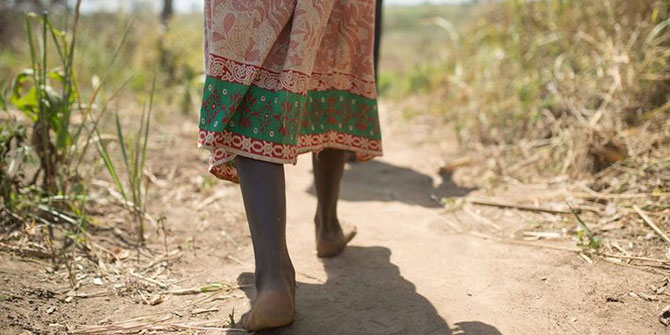The United Nations has designated the theme of International Women’s Day 2023 as “DigitALL: Innovation and technology for gender equality”. Despite the transformative potential of digital technology, women and girls in Africa face a significant disadvantage when it comes to accessing, utilising, and benefiting from digital technologies, writes Simbo Olatoregun.
In sub-Saharan Africa, women are less likely than men to own a mobile phone, and only 60 per cent of women in the region use mobile internet. The digital gender gap is not just a matter of connectivity, it limits women’s access to technology and digital skills, hindering their ability to participate in and benefit from the modern digital economy. This digital gender gap undermines efforts to achieve the Sustainable Development Goals and the African Union’s Agenda 2063, which emphasises the importance of gender equality and women’s empowerment in Africa as drivers of growth.
The digital gender gap in Africa can be attributed to a variety of factors. Women and girls are often subjected to gender-based discrimination, including restrictions on education and agency, which limits their access to digital technologies. Industry group GSMA reports that 80 per cent of women in low- and middle-income countries lack confidence in their digital skills which limits their ability to make full advantage of the potential of the digital economy. Inadequate infrastructure is also a challenge, as many women and girls lack access to reliable electricity and internet connectivity. This is particularly pronounced in rural areas, where more than 70 per cent of the population in sub-Saharan Africa live without electricity.
Totalling up the cost
Africa’s Digital Economy is projected to be worth $180bn by 2025, with the potential to reach $712 billion by 2050, but women are being left out of this massive market. The exclusion of women from the digital economy is estimated to have cost low- and middle-income countries $1 trillion over the last decade. This loss is expected to increase to $1.5 trillion by 2025 unless measures are taken to address the issue. Limited access to digital technologies and training constrains women’s economic opportunities, as jobs increasingly require digital skills. The digital gender divide, therefore, exacerbates existing inequalities in education, health, and social participation.
AI and other new technologies offer the chance to bypass traditional development pathways and achieve transformative change. But AI systems are only as good as the data they are trained on, and biased data sets generate biased results. Women’s under-representation in the technology sector limits their ability to shape the development of AI and new technologies to address gender-specific needs. In 2020, only 12 per cent of global professionals in cloud computing were women, while the numbers for engineering and Data and AI stood at 15 per cent and 26 per cent, respectively. In Africa, this gap is likely to be much wider. Technologies that could help to reduce inequalities are therefore in danger of perpetuating them.
In the private sector, both Facebook and Google have invested in subsea cables to increase broadband access and bring internet infrastructure to millions. Most multinational tech outfits operating on the continent have some form of digital skills training program in existence, most sub-Saharan African countries have a national digital strategy, and multilaterals like the African Development Bank continue to invest in digital inclusion with a focus on youth and women. However, more needs to be done.
A call to action
Finding solutions to the digital gender divide in Africa will require a deliberate, multifaceted, and collaborative approach, involving policymakers, civil society organisations, the private sector, and development partners.
First, we must continue to prioritise the collection and application of gender-disaggregated data to design and implement gender-sensitive policies and programs. Governments should also continue to implement policies that promote gender equality in education, in particular STEM subjects such as science, technology, engineering, and mathematics. This is crucial to ensuring that women and girls are equipped with the skills required to participate meaningfully in the digital economy.
Socio-cultural norms that limit women’s access to digital technologies must also be challenged through community outreach programs that educate both men and women on the benefits of digital literacy. This should be done alongside efforts to increase access to reliable electricity and internet infrastructure, especially in rural areas.
Efforts to reduce the cost of digital devices and internet access must continue to be prioritised to improve affordability and increase access. People should not have to choose between being able to eat or accessing digital platforms. The safety of women and girls on digital platforms must be a priority, women and girls across the continent should feel safe to navigate the internet and leverage digital technologies.
Finally, it is imperative to maintain the continuity of digital literacy programs that currently exist while simultaneously incorporating emerging technologies into their curriculum. It may seem that there is a plethora of digital skills and literacy programming readily available, however, until the digital gender gap no longer exists, these programs will continue to be valuable. It is therefore imperative that new programs being designed for AI and other emergent technologies have gender equity at the forefront of their design to ensure women are involved early and to avoid potential inherited bias.
In conclusion, the economic, social, and human rights implications of the digital gender gap cannot be overstated, and stakeholders must work together to bridge this gap. As the world becomes increasingly digitised, we cannot afford to leave half of Africa behind.
Photo credit: Pixabay



